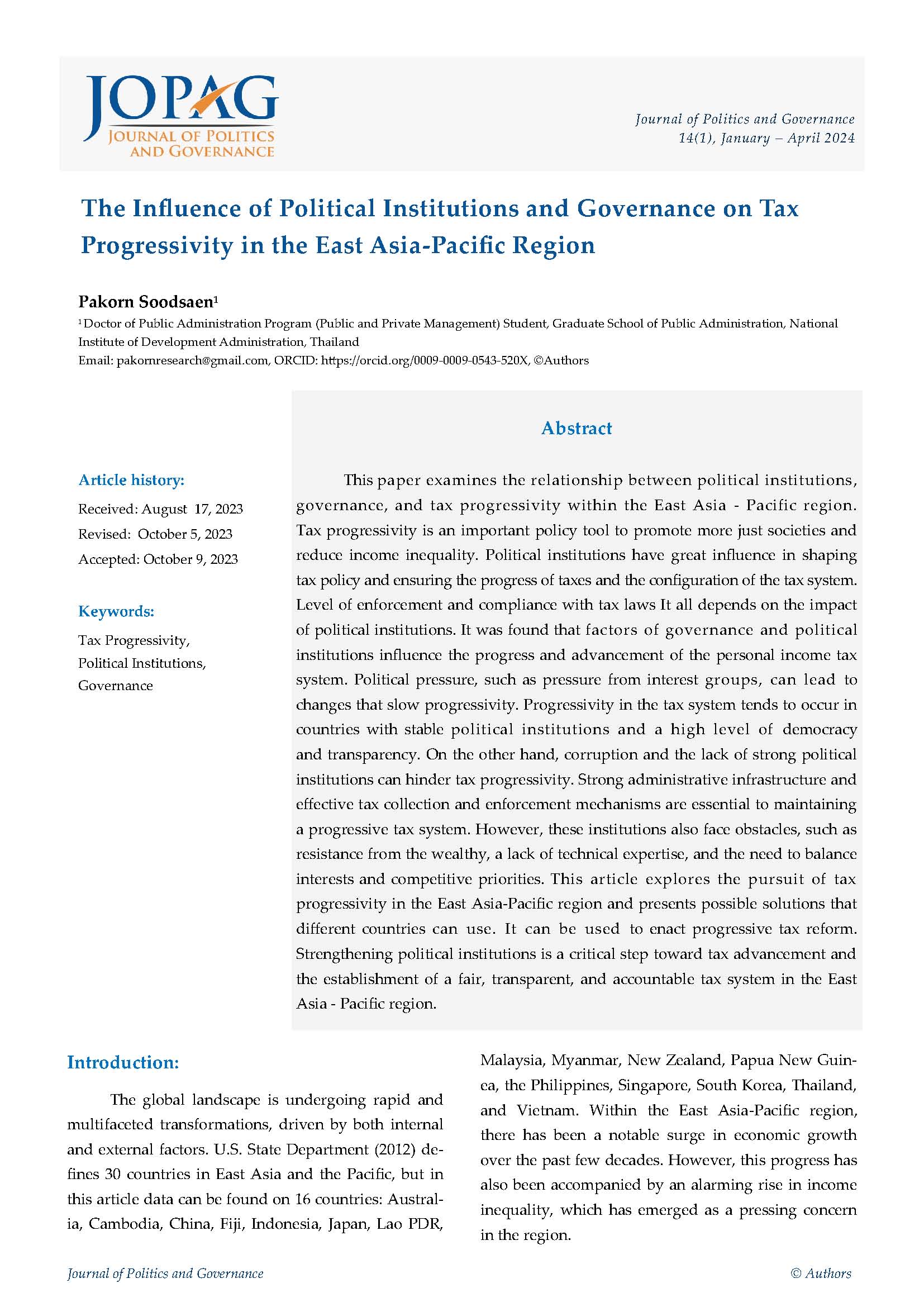The Influence of Political Institutions and Governance on Tax Progressivity in the East Asia-Pacific Region
Main Article Content
Abstract
This paper examines the relationship between political institutions, governance, and tax progressivity within the East Asia - Pacific region. Tax progressivity is an important policy tool to promote more just societies and reduce income inequality. Political institutions have great influence in shaping tax policy and ensuring the progress of taxes and the configuration of the tax system. Level of enforcement and compliance with tax laws It all depends on the impact of political institutions. It was found that factors of governance and political institutions influence the progress and advancement of the personal income tax system. Political pressure, such as pressure from interest groups, can lead to changes that slow progressivity. Progressivity in the tax system tends to occur in countries with stable political institutions and a high level of democracy and transparency. On the other hand, corruption and the lack of strong political institutions can hinder tax progressivity. Strong administrative infrastructure and effective tax collection and enforcement mechanisms are essential to maintaining a progressive tax system. However, these institutions also face obstacles, such as resistance from the wealthy, a lack of technical expertise, and the need to balance interests and competitive priorities. This article explores the pursuit of tax progressivity in the East Asia-Pacific region and presents possible solutions that different countries can use. It can be used to enact progressive tax reform. Strengthening political institutions is a critical step toward tax advancement and the establishment of a fair, transparent, and accountable tax system in the East Asia - Pacific region.
Article Details

This work is licensed under a Creative Commons Attribution-NonCommercial-NoDerivatives 4.0 International License.
References
Ajaz, T., & Ahmad, E. (2010). The effect of corruption and governance on tax revenues. The Pakistan Development Review, 405-417.
Balamatsias, P. (2018). Democracy and taxation. Economics. The open-access, open-assessment e-journal, 12(1). https://doi.org/10.5018/economics-ejournal.ja.2018-27
Chhotray, V., & Stoker, G. (2009). Governance: From theory to practice. In Governance theory and practice (pp. 214-247). Springer. https://doi.org/https://doi.org/10.1111/j.1467-9299.2009.01793_6.x
Epaphra, M., & Massawe, J. (2017). Corruption, governance and tax revenues in Africa. Business and economic horizons, 13(4), 439-467. https://doi.org/10.15208/beh.2017.31
Förster, M., Llena-Nozal, A., & Nafilyan, V. (2014). Trends in top incomes and their taxation in OECD countries.
Gerber, C., Klemm, A., Liu, L., & Mylonas, V. (2018). Personal Income Tax Progressivity: Trends and Implications. IMF working paper, 18(246), 1. https://doi.org/10.5089/9781484383087.001
Gerber, C., Klemm, A., Liu, L., & Mylonas, V. (2020). Income Tax Progressivity: Trends and Implications. Oxford Bulletin of Economics and Statistics, 82(2), 365-386. https://doi.org/https://doi.org/10.1111/obes.12331
Greiner, A. (2006). Progressive Taxation, Public Capital, and Endogenous Growth. FinanzArchiv/Public Finance Analysis, 62(3), 353-366. http://www.jstor.org/stable/40913120
Heathcote, J., Storesletten, K., & Violante, G. (2020). How Should Tax Progressivity Respond to Rising Income Inequality?. https://doi.org/10.21034/sr.615
Heer, B., & Rohrbacher, S. (2021). Endogenous longevity and optimal tax progressivity. Journal of Health Economics, 79, 102515. https://doi.org/10.1016/j.jhealeco.2021.102515
International Monetary Fund. (1997). Good Governance: The IMF's Role.
Kakwani, N., & Son, H. H. (2021). Normative Measures of Tax Progressivity: an International Comparison [Original Paper]. The Journal of Economic Inequality, 19(1), 185-212. https://doi.org/10.1007/s10888-020-09463-6
Kakwani, N. C. (1977). Measurement of Tax Progressivity: An International Comparison. The Economic journal (London), 87(345), 71-80. https://doi.org/10.2307/2231833
Kaufmann, D. A., Kraay, A. C., & Mastruzzi, M. (2010). The Worldwide Governance Indicators: Methodology and Analytical Issues. Hague Journal on the Rule of Law, 3, 220-246.
Kenny, L. W., & Winer, S. L. (2006). Tax Systems in the World: An Empirical Investigation into the Importance of Tax Bases, Administration Costs, Scale and Political Regime. International tax and public finance, 13(2), 181-215. https://doi.org/ 10.1007/s10797-006-3564-7
Kifordu, A. A., Igweh, F. K., & Aloamaka, J. I. (2020). The Impact of Taxation and the Quest for Good Governance: Evidence from Nigeria. Webology, 17(2).
Lines, T. (2019). Nordic Countries’ Support for Tax & Development. Oslo: Tax Justice Network Norway.
Mirrlees, J. A. (1971). An Exploration in the Theory of Optimum Income Taxation. The Review of economic studies, 38(2), 175-208. https://doi.org/ 10.2307/2296779
Mutascu, M. (2011). Taxation and democracy. Journal of economic policy reform, 14(4), 343-348. https://doi.org/10.1080/17487870.2011.635037
North, D. C. (1991). Institutions. Journal of economic perspectives, 5(1), 97-112.
Our World Data. (2021a). Democracy Index. https://ourworldindata.org/grapher/democracy-index-polity?tab=chart&time=2000..latest
Our World Data. (2021b). Economic Growth.
Our World Data. (2021c). Poverty. https://ourworldindata. org/poverty
Papanikolaou, N. (2021). Tax Progressivity of Personal Wages and Income Inequality. Journal of risk and financial management, 14(2), 60. https://doi.org/ 10.3390/jrfm14020060
Persson, T., & Tabellini, G. (2004). Constitutional Rules and Fiscal Policy Outcomes. The American economic review, 94(1), 25-45. https://doi.org/10.1257/000282804322970689
Profeta, P., Puglisi, R., & Scabrosetti, S. (2013). Does democracy affect taxation and government spending? Evidence from developing countries. Journal of Comparative Economics, 41(3), 684-718. https://doi.org/10.1016/j.jce.2012.10.004
Ramsey, F. P. (1927). A Contribution to the Theory of Taxation. The Economic journal (London), 37(145), 47-61. https://doi.org/10.2307/2222721
Rhodes, R. A. W. (1996). The New Governance: Governing without Government. Political studies, 44(4), 652-667. https://doi.org/10.1111/j.1467-9248.1996.tb01747.x
Rubolino, E., & Waldenström, D. (2020). Tax progressivity and top incomes evidence from tax reforms. Journal of economic inequality, 18(3), 261-289. https://doi.org/10.1007/s10888-020-09445-8
Smith, A. (1998). An inquiry into the nature and causes of the wealth of nations [Book]. Generic NL Freebook Publisher. https://search.ebscohost.com/login.aspx?direct=true&db=nlebk&AN= 1086046&site=ehost-live&scope=site
Stoker, G. (1998). Governance as theory: five propositions. International social science journal, 50(155), 17-28.
Tax Foundation. (2017). Preliminary Details and Analysis of the Tax Cuts and Jobs Act. https://taxfoundation. org/final-tax-cuts-and-jobs-act-details-analysis/
U.S. State Department. (2012). East Asia and Pacific Region. https://2009-2017.state.gov/s/d/rm/rls/perfrpt/2011performancesummary/html/191464.htm
World Bank. (1989). Sub-Saharan Africa : from crisis to sustainable growth : a long-term perspective study. World Bank.
World Bank. (1992). Governance and development. World Bank.
Xu, H., & Cui, H. (2009). Personal income tax policy in China and the United States: a comparative analysis. Public Administration Review, 69, S75-S81.
Zaaruka, B., & Fedderke, J. (2011). Measuring institutions: Indicators of political and economic institutions in namibia: 1884-2008. Journal of Development Perspectives, 1(1-2), 96–118. https://doi.org/10.5325/jdevepers.1.1-2.0096


